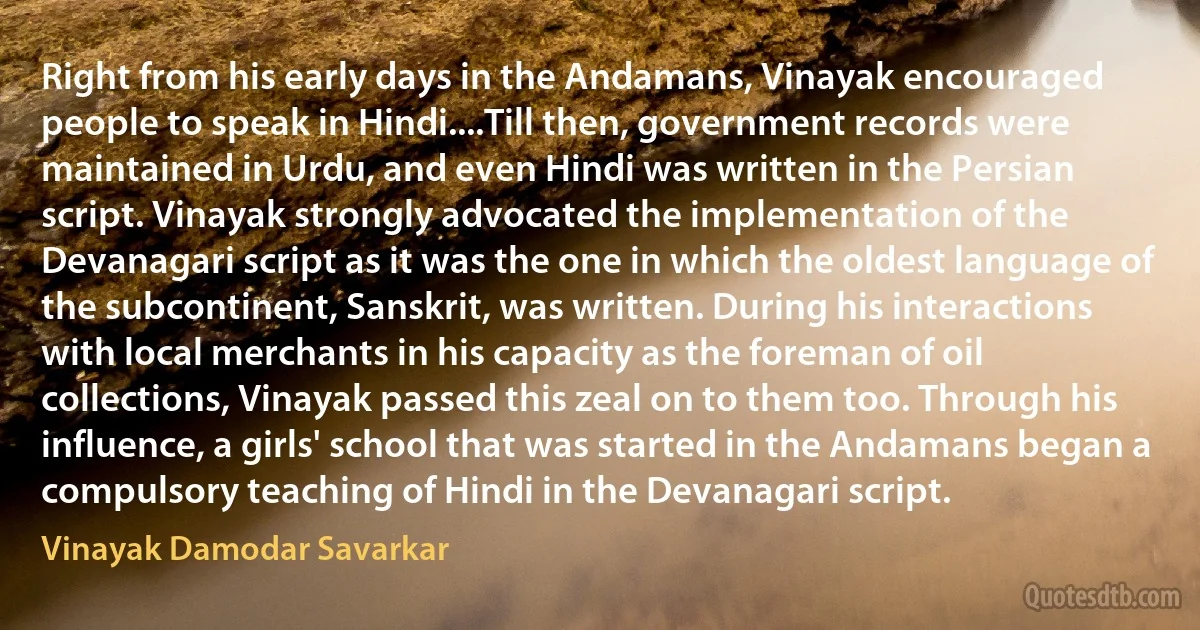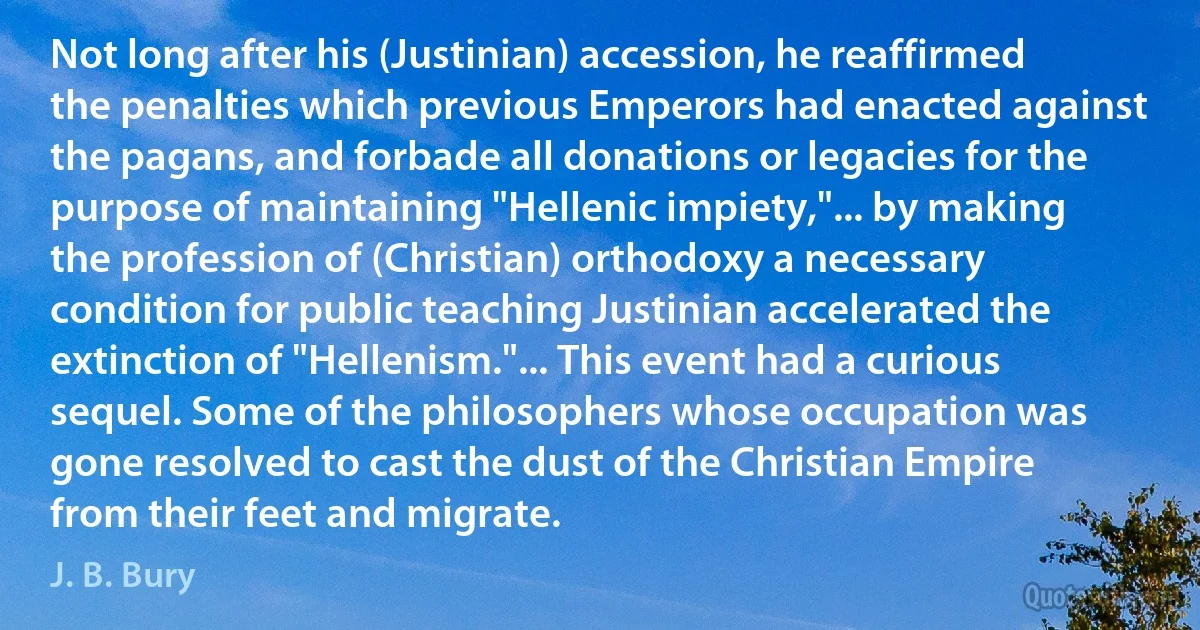Teaching Quotes - page 22
Quickly or slowly, according as that probation is lived nobly or poorly, another summons comes to him, when the Master sees that he has gained to a considerable extent the Qualifications which are necessary, and needs a further fuller teaching in order that he may apply his knowledge more efficiently to life. Again he is called; again he sees his Master. And then the Master accepts him as disciple, no longer on probation, but accepted and approved; now his consciousness is to begin to blend with the consciousness of his Master, and he is to feel His presence more clearly.

Annie Besant
It is from the traditional family that we absorb those universal ideals and principles which are the teaching of Jesus, the bedrock of our religious faith. We are taught the difference between right and wrong, and about the law, just punishment and discipline. We are taught to obey our parents, as Jesus did, and about the sanctity of truth and life itself. We are warned against lying, cheating and stealing. We learn that we must respect the person and property of others, care for each other, live and work together in cooperation, show loyalty, patience, kindness and share what we have. The family teaches us about the importance of knowledge, education, hard work and effort. It teaches us about enjoying ourselves, having fun, keeping fit and healthy.

Kamisese Mara
Argument almost always leaves behind a sore feeling in the heart of the one who has been worsted. By loving teaching, by Christ-like living, we are to win this people for our Lord. They do not understand what disinterested love and unselfishness mean: you are to go and live it amont them.

James Hudson Taylor
This is precisely what is decisive in Nietzsche's conception of art, that he sees it in its essential entirety in terms of the artist; this he does consciously and in explicit opposition to that conception of art which represents it in terms of those who "enjoy” and "experience” it.
That is a guiding principle of Nietzsche's teaching on art: art must be grasped in terms of creators and producers, not recipients. Nietzsche expresses it unequivocally in the following words (WM, 811): "Our aesthetics heretofore has been a woman's aesthetics, inasmuch as only the recipients of art have formulated their experiences of ‘what is beautiful.' In all philosophy to date the artist is missing.” Philosophy of art means "aesthetics” for Nietzsche too-but masculine aesthetics, not feminine aesthetics. The question of art is the question of the artist as the productive, creative one; his experiences of what is beautiful must provide the standard.

Martin Heidegger
The sweetest teaching did he introduce,
Concealing truth under untrue speech.
The place he spoke of as the gods' abode
Was that by which he might awe humans most, -
The place from which, he knew, terrors came to mortals
And things advantageous in their wearisome life -
The revolving heaven above, in which dwell
The lightnings, and awesome claps
Of thunder, and the starry face of heaven,
Beautiful and intricate by that wise craftsman Time, -
From which, too, the meteor's glowing mass speeds
And wet thunderstorm pours forth upon the earth.

Euripides
The Lord Cherisher of the Faith learnt that in the provinces of Tatta, Multan, and especially at Benares, the Brahman misbelievers used to teach their false books in their established schools, and that admirers and students both Hindu and Muslim, used to come from great distances to these misguided men in order to acquire this vile learning. His Majesty, eager to establish Islam, issued orders to the governors of all the provinces to demolish the schools and temples of the infidels and with the utmost urgency put down the teaching and the public practice of the religion of these misbelievers. (...) It was reported that, according to the Emperor's command, his officers had demolished the temple of Viswanath at Kashi.

Aurangzeb
As his blessed nature dictated, he was characterized by perfect devotion to the rites of the Faith; he followed the teaching of the great Imam. Abu Hanifa (God be pleased with him!), and established and enforced to the best of his power the five foundations of Islam'Through the auspices of his hearty endeavour, the Hanafi creed (i. e., the Orthodox Sunni faith) has gained such strength and currency in the great country of Hindustan as was never seen in the times of any of the preceding sovereigns. By one stroke of the pen, the Hindu clerks (writers) were dismissed from the public employment. Large numbers of the places of worship of the infidels and great temples of these wicked people have been thrown down and desolated. Men who can see only the outside of things are filled with wonder at the successful accomplishment of such a seemingly difficult task. And on the sites of the temples lofty mosques have been built.

Aurangzeb
My sermons are criticized by certain audiences. They say that my sermons are hollow, not holy. I agree with them because I myself am not holy. The Buddha's teaching guides people to the place where there is nothing special... People often misunderstand faith as kind of ecstasy of intoxication... True faith is sobering up from such intoxication.

Kodo Sawaki
My father's moral inculcations were at all times mainly those of the "Socratici viri;" justice, temperance (to which he gave a very extended application), veracity, perseverance, readiness to encounter pain and especially labour; regard for the public good; estimation of persons according to their merits, and of things according to their intrinsic usefulness; a life of exertion in contradiction to one of self-indulgent sloth. These and other moralities he conveyed in brief sentences, uttered as occasion arose, of grave exhortation, or stern reprobation and contemp. But though direct moral teaching does much, indirect does more; and the effect my father produced on my character, did not depend solely on what he said or did with that direct object, but also, and still more, on what manner of man he was.

John Stuart Mill
Most boys or youths who have had much knowledge drilled into them, have their mental capacities not strengthened, but over-laid by it. They are crammed with mere facts, and with the opinions or phrases of other people, and these are accepted as a substitute for the power to form opinions of their own: and thus the sons of eminent fathers, who have spared no pains in their education, so often grow up mere parroters of what they have learnt, incapable of using their minds except in the furrows traced for them. Mine, however, was not an education of cram. My father never permitted anything which I learnt to degenerate into a mere exercise of memory. He strove to make the understanding not only go along with every step of the teaching, but, if possible, precede it. Anything which could be found out by thinking I never was told, until I had exhausted my efforts to find it out for myself.

John Stuart Mill
He was often, and much beyond reason, provoked by my failures in cases where success could not have been expected; but in the main his method was right, and it succeeded. I do not believe that any scientific teaching ever was more thorough, or better fitted for training the faculties, than the mode in which logic and political economy were taught to me by my father. Striving, even in an exaggerated degree, to call forth the activity of my faculties, by making me find out everything for myself, he gave his explanations not before, but after, I had felt the full force of the difficulties; and not only gave me an accurate knowledge of these two great subjects, as far as they were then understood, but made me a thinker on both.

John Stuart Mill



